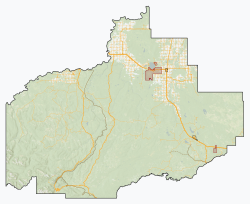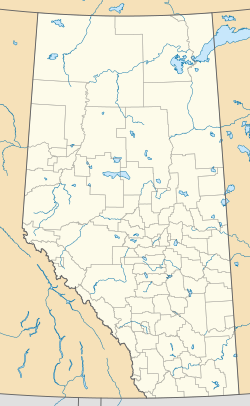Grande Cache
Grande Cache | |
|---|---|
Hamlet | |
 Highway 40 through Grande Cache | |
Location in M.D. of Greenview Location in Alberta | |
| Coordinates: 53°53′19″N 119°07′06″W / 53.88861°N 119.11833°W | |
| Country | Canada |
| Province | Alberta |
| Region | Northern Alberta |
| Planning region | Upper Peace |
| Municipal district | Greenview |
| Incorporated[1][2] | |
| • New town | September 1, 1966 |
| • Town | September 1, 1983 |
| Dissolved (Hamlet) | January 1, 2019 |
| Government | |
| • Governing body | Municipal District of Greenview No. 16 Council |
| • MP | Gerald Soroka (Cons - Yellowhead) |
| • MLAs | Martin Long (UCP - West Yellowhead) |
| Area (2021)[3] | |
| • Land | 35.21 km2 (13.59 sq mi) |
| Elevation | 1,220 m (4,000 ft) |
| Population (2021)[3] | |
• Total | 3,276 |
| • Density | 93/km2 (240/sq mi) |
| Time zone | UTC−7 (MST) |
| • Summer (DST) | UTC−6 (MDT) |
| Postal code | |
| Area code | +1-780 |
| Website | Official website |
Grande Cache is a hamlet in West-Central Alberta, Canada within and administered by the Municipal District of Greenview No. 16.[5] It is located on Highway 40 approximately 145 kilometres (90 mi) northwest of Hinton and 435 kilometres (270 mi) west of Edmonton. Grande Cache overlooks the Smoky River, is at the northern edge of Alberta's Rockies, and serves as a gateway to the Willmore Wilderness Park. The hamlet held town status prior to 2019.
History
The New Town of Grande Cache was incorporated on September 1, 1966.[1] The purpose of creating a new town was to open the area for the development of coal mines. New town status allowed the town to use the Government of Alberta as a guarantor for debt.
Construction of Grande Cache began in 1969. By 1971 a hospital, schools, stores, and the first homes were built.
Grande Cache received town status on September 1, 1983.[1]
The community suffered a boom-bust cycle due to the dependence on a single employer that depended on a single commodity: coal. In an attempt to diversify the economy additional industries were encouraged to develop in the area. This included a wood chip plant and a federal prison operated by the Correctional Service of Canada. In recent years, wilderness tourism is an increasing industry.
Coal has been pivotal to Grande Cache's history. The British Coal Board established a large mine in 1966 to produce metallurgical coal which was used in Japanese coke ovens to provide the carbon input for steel production. It is important to note that Grande Cache's coal typically was not intended for power generation due to its low volatiles content.[6] According to the NY Times in 1971: "Japanese steel makers, or their customers, are paying the relocation costs of miners who have come to Grande Cache from Nova Scotia's fading Cape Breton coal mines, from the dying wheat hamlets of Saskatchewan, from Utah and Montana mines and from South Korea, Japan, West Germany, the Netherlands and Britain."[7]
In September 2018, Grande Cache's Town Council determined that, due to a reduction in population and the subsequent loss in tax revenue, the town was no longer financially sustainable.[8] On September 25, 2018, town residents voted to dissolve the town into a hamlet under the jurisdiction of the Municipal District (MD) of Greenview No. 16.[9] Out of 1,100 ballots cast in the vote, 1,065 were votes in favour of dissolution, 32 were in favour of remaining a town, and 3 ballots were rejected.[9] The dissolution came into effect on January 1, 2019, rendering Grande Cache a hamlet in the Municipal District of Greenview No. 16.[2]
Geography

The hamlet is built on a plateau that is just below the subalpine level of the Rocky Mountains. The town site is surrounded by three valleys: to the north is the Smoky River; to the west is the Sulphur River; to the south is Victor Lake and Grande Cache Lake. To the east of town is Grande Mountain.
Climate
Grande Cache experiences a subarctic climate (Köppen climate classification Dfc). Summertime is usually very mild, but can also be very cool or warm depending on the movement of different airmasses in the area. Wintertime is very cold and snowy, lasting from November into March, and sometimes even later.
| Climate data for Grande Cache | |||||||||||||
|---|---|---|---|---|---|---|---|---|---|---|---|---|---|
| Month | Jan | Feb | Mar | Apr | May | Jun | Jul | Aug | Sep | Oct | Nov | Dec | Year |
| Record high °C (°F) | 14 (57) |
16 (61) |
18 (64) |
25 (77) |
29.5 (85.1) |
34.5 (94.1) |
31 (88) |
31 (88) |
32 (90) |
24 (75) |
18 (64) |
16 (61) |
34.5 (94.1) |
| Mean daily maximum °C (°F) | −2.2 (28.0) |
−1 (30) |
2.6 (36.7) |
8.5 (47.3) |
13.3 (55.9) |
17.1 (62.8) |
19.6 (67.3) |
19 (66) |
14.7 (58.5) |
9 (48) |
0.6 (33.1) |
−2.5 (27.5) |
8.2 (46.8) |
| Daily mean °C (°F) | −7.1 (19.2) |
−6.5 (20.3) |
−2.9 (26.8) |
2.7 (36.9) |
7.3 (45.1) |
11.1 (52.0) |
13.3 (55.9) |
12.7 (54.9) |
8.9 (48.0) |
4 (39) |
−4.2 (24.4) |
−7.5 (18.5) |
2.7 (36.9) |
| Mean daily minimum °C (°F) | −12.1 (10.2) |
−11.9 (10.6) |
−8.4 (16.9) |
−3.2 (26.2) |
1.4 (34.5) |
5 (41) |
7 (45) |
6.4 (43.5) |
3.1 (37.6) |
−1.1 (30.0) |
−8.9 (16.0) |
−12.5 (9.5) |
−2.9 (26.8) |
| Record low °C (°F) | −39 (−38) |
−41 (−42) |
−37.8 (−36.0) |
−22 (−8) |
−12 (10) |
−3.9 (25.0) |
0.5 (32.9) |
−5 (23) |
−10 (14) |
−30 (−22) |
−43 (−45) |
−41 (−42) |
−43 (−45) |
| Average precipitation mm (inches) | 24.9 (0.98) |
26.6 (1.05) |
30.5 (1.20) |
25.6 (1.01) |
57.8 (2.28) |
69 (2.7) |
83.2 (3.28) |
70.1 (2.76) |
52.5 (2.07) |
34.3 (1.35) |
33.6 (1.32) |
31.5 (1.24) |
539.6 (21.24) |
| Source: Environment Canada[10][11] | |||||||||||||
Demographics
In the 2021 Census of Population conducted by Statistics Canada, Grande Cache had a population of 3,276 living in 1,238 of its 1,533 total private dwellings, a change of -8.3% from its 2016 population of 3,571. With a land area of 35.21 km2 (13.59 sq mi), it had a population density of 93.0/km2 (241.0/sq mi) in 2021.[3]
As a designated place in the 2016 Census of Population conducted by Statistics Canada, Grande Cache had a population of 3,571 living in 1,296 of its 1,759 total private dwellings, a -17.3% change from its 2011 population of 4,319. With a land area of 34.97 km2 (13.50 sq mi), it had a population density of 102.1/km2 (264.5/sq mi) in 2016.[17]
Attractions
- Grande Cache Recreation Centre
- Grande Cache Golf and Country Club
- Great Canadian Death Race
- Willmore Wilderness Park
- Grande Cache Tourism & Interpretive Centre
- Sulphur Gates Provincial Park
Sports
Grande Cache is the home of the Canadian Death Race.
Infrastructure
Grande Cache is the site of the Grande Cache Institution, a medium-security prison.
Transportation
Grande Cache is connected to Grande Prairie and Hinton via Highway 40. There is a Community Bus that provides transportation to both Grande Prairie and Hinton weekly. Additionally, the Community Bus provides transportation to the Cooperatives and Enterprises and local community businesses weekly. Grande Cache Airport is 24 km (15 mi) outside of town. There are no scheduled flights into Grande Cache Airport. The airport closed as of January 2017.
Education
Local schools in Grande Cache include:
- Sheldon Coates Elementary School (K-3);
- Summitview School (grades 4-8);
- SonRise Christian School (K-6) (Closed in 22/23 year);
- Grande Cache Community High School (grades 9-12);
Notable people
- Dean McAmmond, professional hockey player
- Travis Roche, professional hockey player
See also
- List of communities in Alberta
- List of former urban municipalities in Alberta
- List of hamlets in Alberta
References
- ^ a b c "Location and History Profile: Town of Grande Cache" (PDF). Alberta Municipal Affairs. October 7, 2016. p. 274. Retrieved October 11, 2016.
- ^ a b "Order in Council (O.C.) 361/2018". Government of Alberta. November 27, 2018. Retrieved January 13, 2019.
- ^ a b c d "Population and dwelling counts: Canada and designated places". Statistics Canada. February 9, 2022. Retrieved February 10, 2022.
- ^ "Alberta Private Sewage Systems 2009 Standard of Practice Handbook: Appendix A.3 Alberta Design Data (A.3.A. Alberta Climate Design Data by Town)" (PDF) (PDF). Safety Codes Council. January 2012. pp. 212–215 (PDF pages 226–229). Archived from the original (PDF) on October 16, 2013. Retrieved October 8, 2013.
- ^ "Specialized and Rural Municipalities and Their Communities" (PDF). Alberta Municipal Affairs. June 3, 2024. Retrieved June 14, 2024.
- ^ "CST Coal No.8 Mine (Grande Cache) Mine". MDO Mining Intelligence and News.
- ^ "Boom Town Is Built on Coal". The New York Times. 1971.
- ^ "Grande Cache deemed not viable to carry on as a town". Global News. September 19, 2018. Retrieved September 19, 2018.
- ^ a b "Residents of Grande Cache vote to dissolve town". Global News. September 26, 2018. Retrieved September 26, 2018.
- ^ Environment Canada Canadian Climate Normals 1971–2000, accessed 24 July 2009
- ^ Canada, Environment and Climate Change (October 31, 2011). "Almanac Averages and Extremes for June 27 - Climate - Environment and Climate Change Canada". climate.weather.gc.ca. Retrieved June 28, 2021.
- ^ "Table 3: Population for census divisions and subdivisions, 1971 and 1976". 1976 Census of Canada. Census Divisions and Subdivisions, Western Provinces and the Territories. Vol. Population: Geographic Distributions. Ottawa: Statistics Canada. 1977.
- ^ "Table 2: Census Subdivisions in Alphabetical Order, Showing Population Rank, Canada, 1981". 1981 Census of Canada. Vol. Census subdivisions in decreasing population order. Ottawa: Statistics Canada. 1982. ISBN 0-660-51563-6.
- ^ "Table 2: Population and Dwelling Counts, for Census Divisions and Census Subdivisions, 1986 and 1991 – 100% Data". 91 Census. Vol. Population and Dwelling Counts – Census Divisions and Census Subdivisions. Ottawa: Statistics Canada. 1992. pp. 100–108. ISBN 0-660-57115-3.
- ^ "Population and Dwelling Counts, for Canada, Provinces and Territories, and Census Divisions, 2001 and 1996 Censuses – 100% Data (Alberta)". Statistics Canada. Retrieved May 25, 2019.
- ^ "Population and dwelling counts, for Canada, provinces and territories, and census subdivisions (municipalities), 2006 and 2001 censuses – 100% data (Alberta)". Statistics Canada. January 6, 2010. Retrieved May 25, 2019.
- ^ a b "Population and dwelling counts, for Canada, provinces and territories, and census subdivisions (municipalities), 2016 and 2011 censuses – 100% data (Alberta)". Statistics Canada. February 8, 2017. Retrieved February 8, 2017.


